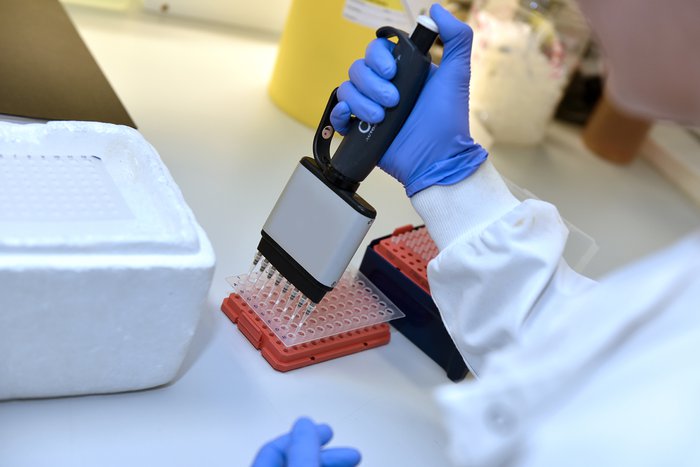Antibiotic shows potential in helping treat aggressive blood cancer
A type of aggressive blood cancer could be made more sensitive to chemotherapy using an antibiotic currently available to treat diarrhoea, according to new research published today in Science Translational Medicine.

Funded by Cancer Research UK and Blood Cancer UK, the study looked to tackle a specific type of acute myeloid leukaemia (AML) that contains a genetic change known as MLL, by investigating the disease’s origins.
This type of leukaemia, often referred to as MLL-AML, has a particularly poor prognosis as it quickly becomes resistant to the standard chemotherapies used to treat it. Tackling this resistance is a major challenge in successfully treating the disease, as it can leave patients with no other options.
Michelle Mitchell, chief executive of Cancer Research UK, said: “Resistance to treatments is one of the biggest challenges facing cancer research, and learning that there are no other treatment options is understandably one of the worst things a patient could hear. This research demonstrates how unpicking the biology of cancer can lead to surprising discoveries, and that we may have a vast array of drugs already out there that could help boost the effects of current treatments.”
What is MLL-AML?
Acute myeloid leukaemia is a diverse disease, with many different subtypes depending on the genetic mutations that drive it. This can affect how successfully the cancer can be treated, with some subtypes having a much poorer prognosis than others. MLL-AML is one of the worst, with just 1 in 4 patients surviving 2 to5 years or more. Read more about our research into AML.
Delving into cancer’s origins
A big challenge for researchers has been understanding why some AMLs respond to treatment, while others become resistant. Early work in mice has pointed towards a cancer’s origins as being important, but confirming this in human cells has proved difficult.
Led by Professor Eric So at King’s College London, researchers studied how MLL-AML develops in humans for the first time, by establishing a new way of modelling how the stem cells that form our blood could turn into AML when affected by the MLL genetic alteration.
This development is an important step forward for AML research
It’s a satisfying moment for So in particular, who was involved in the initial work in mice almost two decades ago.
“Having worked on the research that shed light on the origins of MLL leukaemia in mice 18 years ago, this development is an important step forward for AML research and provides a new avenue to screen for and identify new targets to treat it,” said So.
Using the new approach, So and his team found that the disease could originate from 2 different types of cell, with one leading to more resistant disease than the other.
Studying the more resistant type in detail showed that it produced much more of a particular protein – ABCC3 – than the other, which could be responsible for making it more resistant to chemotherapy.
They confirmed this theory in human cells. When the team removed a cell’s ability to produce ABCC3, they were far more sensitive to chemotherapy.
Dr Fatima Sulaiman, Head of Research at Blood Cancer UK said: “This is exciting research which not only identifies the cells that might stop chemotherapy working in some people with AML, but also identifies a potential way to overcome this.
A fortunate discovery
The next step for the team was to find a drug that could either stop ABCC3 from being made or prevent it from working. By looking into existing research, they found a recent paper that showed that fidaxomicin – an antibiotic currently prescribed to treat diarrhoea caused by the bacteria C. difficile – was effective at inhibiting ABCC3.
“It was both unexpected and, frankly, good fortune that there happened to be a recent study showing an already approved antibiotic could work for this research. It was the perfect candidate to test out,” said So.
Testing the drug on treatment resistant MLL-AML, the team found that it successfully sensitised the cancer to chemotherapy in both cells grown in the lab and in mice.
The researchers now want to test the effectiveness of fidaxomicin at helping to treat MLL-AML in a clinical trial. As fidaxomicin is already used to treat diarrhoea and has been shown to be safe, they hope that a trial could be set up relatively quickly and provide new hope for patients who would have no other options.
“We now need to see further studies testing this approach in people with AML to see how much benefit it could bring,” Sulaiman added.

Want to read more stories like this?
Join our mailing list to get stories like this delivered directly to your inbox every month.
